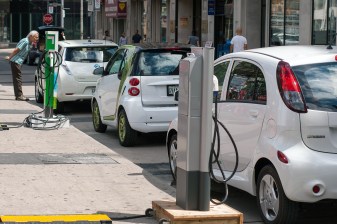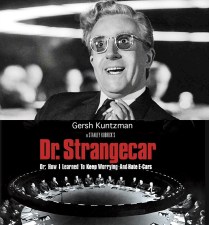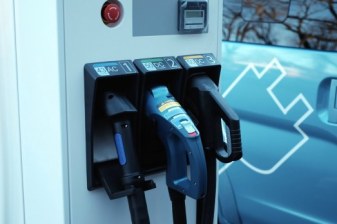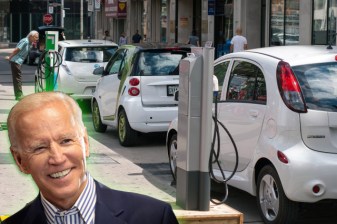City Moves Ahead with Plan to Buy 250 Tesla Squad Cars — And Just Bought 184 Electric Ford Mustangs!
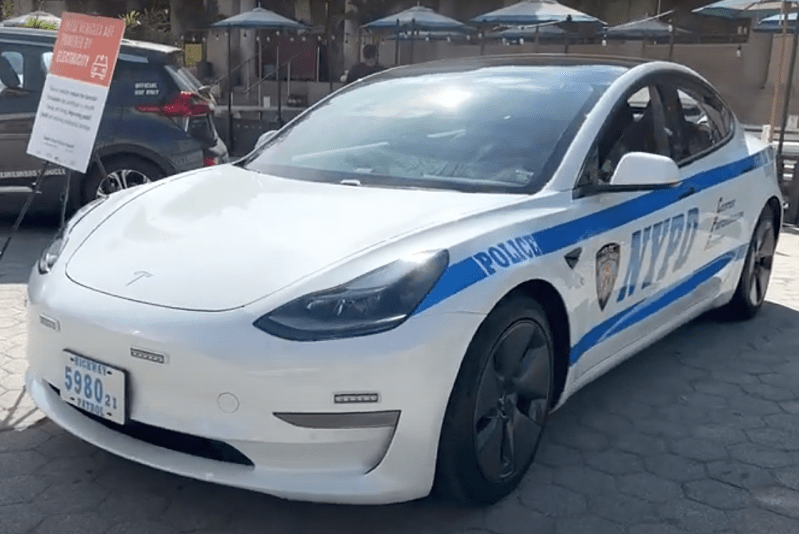

Talk about that new car smell.
The city is moving ahead with a plan to buy up to 250 Tesla Model 3 electric sedans for use as NYPD squad cars over the next five years with a no-bid contract that has raised questions from at least one member of the Council and plenty of members of the public.
But the Department of Citywide Administrative Services says the $49,000 Tesla is a money-saver: The typical NYPD squad car or SUV ranges from $35,000 to close to $58,000, but then needs costly fuel and also far more maintenance than electric cars typically require. (InsideEV has explored the lower costs of electric squad cars.)
“DCAS’s stated mission is to provide effective shared services to support city operations by providing an efficient, cost effective central purchasing function,” the agency said in a statement. “DCAS ensures that products and services purchased support the city’s long-term strategic and environmental goals at the lowest cost and meeting the highest professional standards.”
The agency said a contract to purchase electric SUV squad cars is also in the works (see update below!), but not with Tesla, which does not currently sell an SUV.
But some questions remain unanswered.
For one thing, Tesla requires its purchasers to get their cars serviced at Tesla dealerships, but city police cars are serviced in-house. It is unclear if the Tesla maintenance requirement will eliminate some of the cost efficiencies of in-house servicing.
It’s also unclear how well Teslas perform under police conditions; the city has just one of Elon Musk’s electric sedans patrolling currently: a Model 3 serving in a Queens highway unit. The NYPD declined to answer questions about its performance, durability, charging needs and other metrics.
That’s why Council Member Ben Kallos has been seeking information.
“I wanted to learn more and I still want to learn more,” said the Upper East Side lawmaker, whose tweet earlier this month revealed the contract to the greater public. “I found strange is that it was a sole-source contract. There are other companies making electric cars.”
$12.4 million @Tesla Model 3 order just publicly noticed and I have questions, maybe you do too, what do you want to know? https://t.co/iDKWwr0npp
— Ben Kallos (@kallos) December 9, 2021
Kallos said he requested a copy of the contract, but it has not been provided to him (nor has it been forwarded to Streetsblog on the grounds that it is still being finalized).
Kallos also questioned why the NYPD typically replaces vehicles after three years. “Why can’t we get five years from a police car?” he asked.
After Kallos posted on social media about the contract, members of the public raised other questions:
- One reader pointed out that Chevrolet Bolts are about $10,000 cheaper. (The Department of Correction has at least one Chevy Bolt.)
- Another person reminded that police officers should be encouraged to drive less, not the same amount. “I assume a huge reason given for buying Teslas will be environmental reasons [but] removing vehicles from the fleet will do far more for far cheaper,” tweeted Adam Fisher-Cox.
- Others focused on whether the cars will truly be cheaper to maintain and fuel over the long haul.
In addition, the federal government has raised questions about a game mode that allows drivers to play on the large Tesla touch-screen while the car is in motion. Last month, Tesla recalled 12,000 vehicles owing to a software issue that, “may, under a certain sequence of events, result in false forward-collision warning and/or automatic emergency brake events,” the National Highway Traffic Safety Administration reported. Earlier in the fall, the agency ordered Tesla to provide more information about its so-called Full Self-Driving mode, which, presumably, police officers would not be using.
The city buys about 1,400 police cars a year. In the past, that meant standard sedans. More recently, the agency shifted to SUVs.

But there is some evidence that sedans are going to come back in style. Though the agency bought fewer cars in Fiscal Year 2020 than it has previously, 77 percent were electric or hybrid — and 92 percent of those were sedans.

The Tesla Model 3 is slowly being deployed as a police car all over the United States, with the vehicle being so novel that local papers often write about the new car on the block. Here’s a story from Nitro, West Viriginia; here’s one from Boulder; here’s one from Eden Prairie, Minn.; and here’s one from (checks notes) New York City. In all cases, the local jurisdictions cited the cars’ cost savings over the life of the vehicle and the reduction in greenhouse gas emissions.
Under the $12.4-million contract, the city does not have to buy the Teslas, but can buy any number, up to 250, as it needs on an as-needed basis, the DCAS spokesperson said. The charging infrastructure will not be available to the public when not in use by the NYPD.
UPDATE: On Wednesday, hours after publication of this story, the Department of Citywide Administrative Services put out the following press release announcing that it had placed an order for 184 all-electric Ford Mustang Mach-E Sport Crossover Utility Vehicles for law enforcement and emergency response use (we will be asking some questions, so check back later):
The new electric crossovers, purchased as part of the City’s largest electric vehicle (EV) purchase to date, are slated for use by the New York Police Department, the New York City Sheriff’s Office, the Department of Correction, the Department of Parks and Recreation, the Department of Environmental Protection, NYC Emergency Management, DCAS Police, and the Office of the Chief Medical Examiner. The new electric vehicles will replace gas-powered vehicles currently in the City fleet. The new all-electric crossovers will be received by the City by June 30, 2022.
“Smart investments in fleet electrification will help New York City break its dependence on fossil fuels,” said Dawn M. Pinnock, Acting Commissioner of the NYC Department of Citywide Administrative Services. “We are working successfully towards achieving the ambitious goal of an all-electric City vehicle fleet by 2035 by taking steps to fight the climate crisis every day. It’s gratifying that we are able to build an even greener City fleet while working towards a more equitable city.”
“Every single City vehicle we electrify is one step forward to advance clean air and a climate-friendly New York City, said Ben Furnas, Director of the NYC Mayor’s Office of Climate and Sustainability. “With today’s announcement, we’re making sure that our law enforcement and patrol vehicles are moving away from the polluting fuels of the past and towards a greener future.”
The NYPD alone operates over 6,200 light duty enforcement vehicles, the largest single group of vehicles in the City fleet of nearly 30,000. This order will be the largest all-electric plug-in purchase for law enforcement and pave the way for a transition to all electric by 2035.
“Law enforcement vehicles are the largest and most visible part of our City’s fleet,” said DCAS Deputy Commissioner and NYC Chief Fleet Officer Keith Kerman. “This order of all-electric Mach-Es will enable our law enforcement agencies to put electric models to the full test and work out maintenance, lights and sirens, charging, and other operational issues. It is a critical step towards our goal of a fully electric fleet.”
The all-electric Ford Mustang e-Mach GT models will have 270 miles per range and nearly 27 cubic feet of cargo space, to enable the storage of critical emergency and law enforcement gear. To date, DCAS has installed 29 fast chargers for the NYPD, and 103 fast chargers citywide. DCAS is slated to begin work in 2022 to install 275 additional charging units.
The contract was registered on December 22, 2021 with a minority and/or women-owned business enterprise vendor. DCAS issued a Request for Information in June 2017 to better inform more diversity in the city’s process of bidding for vehicles, equipment, and fuel. This largest EV purchase for law enforcement is also the City’s largest achievement in this MWBE initiative to date. The city will spend $11.5 million on initial orders, and the contract will remain in place for five years.
“We are proudly reaffirming our commitment to minority and women-owned businesses as we take yet another step closer to transforming the City of New York’s vehicle fleet,” said Mersida Ibric, Deputy Commissioner for Procurement at the NYC Department of Citywide Administrative Services. “We are extremely pleased that an M/WBE vendor will be supplying the crossover vehicles.”
“As our elected and environmental leaders work to address climate change locally and around the globe, the NYPD is proud to join with its law enforcement and government partners in New York City in making these vital transportation improvements,” said NYPD Deputy Commissioner of Support Services Robert S. Martinez. “This round of electric vehicle purchases not only satisfies our department’s ongoing public safety mission by enhancing the NYPD’s fleet for the 21st Century, but moves us, collectively, toward a greener, more sustainable future for all.”
“The Sheriff’s Office appreciates the direction of investing in electric vehicles for law enforcement purposes, said New York City Sheriff Joseph Fucito. “Law enforcement EV use is a powerful step towards reducing climate-changing greenhouse gases, lowering the risk of respiratory illnesses, reducing noise, and ending a long reliance on fossil fuels. Protecting people and the environment at the same time are important goals for the future of public safety.”
“We’re proud that our fleet of vehicles is keeping the city and our agency green,” said Department of Correction Commissioner Vincent Schiraldi. “Our goal is always to prepare people for a better future and that includes a healthier planet.”
“We thank Mayor de Blasio and welcome the addition of these electric vehicles to Parks’ fleet of over 450, the largest EV fleet in the city,” said NYC Parks Commissioner Gabrielle Fialkoff. “Electric vehicles are the future of our city and this is another great step towards a greener, cleaner, and more sustainable city for New Yorkers.”
“NYC Emergency Management proudly maintains a fleet of environmentally friendly vehicles that are equipped to aid our agency’s mission. We are committed to being part of the City’s sustainable future and will continue to support the NYC Clean Fleet plan,” said NYC Emergency Management Acting Commissioner Andrew D’Amora.
“As an independent agency in the service of public health and the criminal justice system, we rely on safe and efficient transportation in our work to assist the communities of New York City during the most challenging times,” said Acting Chief Medical Examiner Dr. Jason Graham. “We are proud to grow our fleet of electric vehicles through this procurement and contribute to a healthier and more sustainable future for our city.”
The city already operates the largest electric fleet and charging network in New York State, with over 3,100 plug-in units and 1,070 chargers, including fast, solar, and mobile chargers. In 2019, DCAS launched an initiative to install 100 fast electric vehicle chargers across the five boroughs. This initiative was completed in November, on budget and as scheduled. To date, 11 of these chargers have also been made available for public access.
The investments announced today are part of the $420 million in investments announced last week, the largest in history to electrify a public vehicle fleet, which also included:
The purchase of over 1,250 electric vehicles in 2022 and the installation of at least 1,776 fast chargers citywide by 2030. DCAS will make at least 100 of the 1,776 fast chargers announced last week available to the public. (Guidelines for NYC Fleet Chargers Public Access)
180 solar carports and portable chargers which can be moved from location to location, supporting flexible and emergency charging as the City of New York transitions its entire fleet to electric vehicles. DCAS currently operates 89 solar carports and piloted its first mobile charger.
In 2019, DCAS piloted the use of one million gallons of renewable diesel. Renewable diesel is made from domestic waste products, achieves a 60% greenhouse gas reduction, and features lower tailpipe emissions than fossil fuel. It also is manufactured to the same specification as regular diesel, enabling seamless use by the City fleet and storage in the city’s fuel storage tanks. DCAS plans to introduce additional renewable diesel to the fleet starting this spring.
